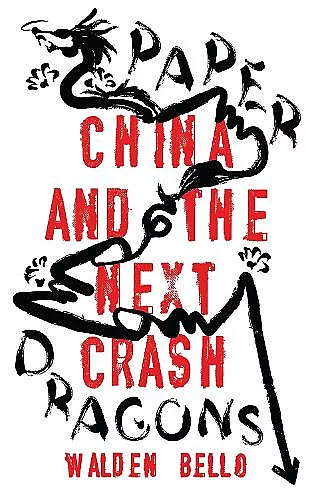Paper Dragons
China and the Next Crash
Format:Hardback
Publisher:Bloomsbury Publishing PLC
Published:15th Aug '19
Should be back in stock very soon

Walden Bello, one of the leading figures of the anti-globalisation movement, reveals how an impending financial crash in China may well bring the rest of the world’s economy down with it.
Walden Bello, one of the leading figures of the anti-globalisation movement, reveals how an impending financial crash in China may well bring the rest of world’s economy down with it.
Emerging relatively unscathed from the banking crisis of 2008, China has been viewed as a model of both rampant success and fiscal stability. But beneath the surface lies a network of fissures that look likely to erupt into the next big financial crash. A bloated real-estate sector, roller-coaster stock market, and rapidly growing shadow-banking sector have all coalesced to create a perfect storm: one that is in danger of taking the rest of the world’s economy with it. Walden Bello traces our recent history of financial crises – from the bursting of Japan’s ‘bubble economy’ in 1990 to Wall Street in 2008 – taking in their political and human ramifications such as rising inequality and environmental degradation. He not only predicts that China might be the site of the next crash, but that under neoliberalism this will simply keep happening. The only way that we can stop this cycle, Bello argues, is through a fundamental change in the ways that we organise: a shift to cooperative enterprise, respectful of the environment, and which fractures the twin legacies of imperialism and capitalism. Insightful, erudite and passionate, Paper Dragons is a must-read for anyone wishing to prevent the next financial meltdThis welcome critique of global finance is admirably angry. * Guardian *
Paper Dragons looks at the economic dangers building up in the Chinese economy and situates them in world economic developments since the Global Financial Crisis. * Green Left *
Walden Bello suggests that, while the next devastating crisis with global ramifications can strike any one of capitalism’s many nodes, the immediate threat comes from Asian giant, China. The lesson? Reform of capitalism may be the immediate call, but in the final analysis we must transform how the system works and we live our lives. * C. P. Chandrasekhar, Professor of Economics, Jawaharlal Nehru University *
Walden Bello argues that fragility remains within the system and points to China as the potential source of the world's next major economic crisis. He raises issues that citizens, policymakers, and financial players ignore at their peril. * Dean Baker, Co-founder and Senior Economist, Center for Economic Policy Research *
Walden Bello shows how global capitalism remains structurally prone to financial crises. With clarity and conviction, Bello continues to explain reality lucidly and inspire progressive alternatives. * Jayati Ghosh, Professor of Economics Jawaharlal Nehru University *
'Startling, revelatory, brilliant! An astonishing exposé of the frightening economic details of this moment. * Jerry Mander, author of The Capitalism Papers *
'In 2008, a U.S. housing bubble careened out of control and plunged the world into a gruesome global financial crisis. Bello brilliantly lays out the case that – unless we put effective checks in place – the next financial crisis will likely erupt in China. * John Cavanagh, Director, Institute for Policy Studies *
In this volume, Walden Bello demonstrates that East and Southeast Asia has been the location of multiple financial crises, despite enjoying an international reputation as a group of successful globalizers. * Manuel Montes, Senior Analyst, South Center, Geneva *
Walden Bello, in this terrifying new book, explains that, if major changes are not taken, the same set of circumstances – unregulated shadow banking, runaway financial speculation and an overheated real estate bubble – are poised to take down China’s economy, and perhaps the world's with it. A very important book for this political moment. * Maude Barlow, author of Blue Future and chairperson of the Council of Canadians *
A stark warning about the vulnerable state of global financial markets from one of our most acute and prescient thinkers. * Naomi Klein, author of This Changes Everything and The Shock Doctrine *
'A tour de force of past and future financial crises by the globe's most astute progressive political economist. Bello puts forward a comprehensive agenda to prevent the next crisis. * Robin Broad, Guggenheim Fellow and Professor, American University *
'Walden Bello brilliantly explains how our global financial system still operates as a giant casino — with China now one of the most reckless gamblers. Read this book to learn how we can tame the global financial casino — before China and other reckless gamblers cause the next crash. * Sarah Anderson, Global Economy Project Director *
Walden Bello is one of the rare truly global thinkers. A must-read for those seeking prevent the next financial meltdown. * Superb.' *
'Crisply and clearly written, Paper Dragons demonstrates that: "Yes, it can happen here, again and again." Politicians and lawmakers everywhere had better get a grip on finance, now. Or watch out, World! * Susan George, President of the Transnational Institute and author of How the Other Half Dies *
Walden Bello is one of the foremost analysts of global economics and politics of our time. He shows that the global economy is a ticking time bomb. Erudite and eloquent, this book could not be timelier. This is a must read. * William I. Robinson, Professor of Sociology, University of California *
'The question may not be if another crash will take place, but when and where will it start. Bello eschews pessimist fatalism, arguing for a broad programme of financial reforms integrated into a comprehensive programme of reforms of the real economy. Inspired and accessible … Wholeheartedly recommended! * Heikki Patomäki, Professor of World Politics, University of Helsinki, author of The Great Eurozone Crisis *
ISBN: 9781786995964
Dimensions: unknown
Weight: 444g
288 pages